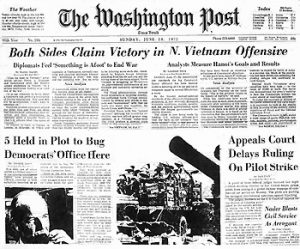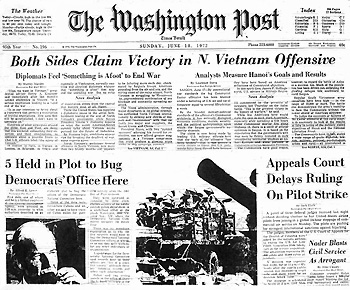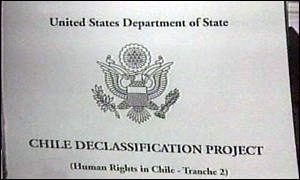Kyle Donahue
Oral History Essay
4/27/17

The headline at the bottom of page one in the Washington Post on Sunday, June 18, 1972, “Five Held in Plot to Bug Democratic Offices Here”.
Watergate, Nixon V. Post
He would wake up at 5:30 am, make a cup of coffee and get ready for work. Once he was ready he would grab the Washington Post at the gas station right around the corner. But he usually wouldn’t get a chance to read it until around lunch time. He is Dennis Smith, and he doesn’t remember much about living in Washington D.C. besides long work hours. That is until the city became the center of a national scandal that put him right in the middle of the news cycle that impacted American politics for the rest of the century.
“Everything changed, we found out what exactly the government had been doing and it scared us,” insisted Dennis Smyth, a Washington D.C. resident during the Watergate scandal.[1] In three phone interviews, Dennis Smyth outlined how the environment changed in Washington D.C. after the Washington Post broke the historic story about the breaking into the Watergate building. Walking down the street, with cars buzzing by, sun in, people rushing to work, people began to read the headline at the bottom of page one in the Washington Post on Sunday, June 18, 1972, “Five Held in Plot to Bug Democratic Offices Here”.[2] Little did Dennis Smyth know that this article, and this investigation would change politics forever.
“I read the Washington Post everyday”[3], recalled Dennis Smyth. The Washington Post was a staple of Washington D.C. and their investigation into the Watergate scandal, which ultimately led to the resignation of Richard Nixon, the 37th president of the United States, changed how the common American viewed politics. H.W Brands, the author of American Dreams, explained how the deception displayed by Nixon and his team created a scandal not seen before, “But forthrightness wasn’t in Nixon’s nature, and rather than revealing information, he did his best to cover it up”[4]. Brands detailed the impact it had on people like Dennis Smyth, “After Vietnam and Watergate, Americans were willing to believe almost anything dastardly about their government.”[5] Dennis Smyth explained the same sentiment outlined by Brands, “I just had never really thought about, or cared enough to think that my government would break the law to this degree. Honestly it wasn’t the actual breaking into the Watergate building that caused me to worry, it was the details of the cover-up and this led me to doubt everything that they had done or were doing.”[6] There were more impacts of the Watergate Scandal then just the resignation of President Nixon, it led to the lack of credibility of special agencies, and a growing pessimism of leaders that people like Dennis Smyth began to feel. It was even more prevalent living in Washington D.C. because the daily life completely changed.
Watergate led to agencies like the CIA to enter the spotlight, Brands explained that, “The agencies involved had been crossing the line for years.” [7] And the uncovering of these events by the Washington Post’s Carl Bernstein, and Bob Woodward, journalists were “more willing to question the government’s official explanation of events.”[8] It became very evident throughout Washington D.C. that questioning politics became front page news. “I would read something new every day”[9] Smyth explained that walking around town everyone had the Post, and it became what everyone was talking about. Living in Washington D.C. Smyth’s viewpoint on the news cycle demonstrates Brand’s narrative of how politics changed after Watergate. For example, after Watergate the CIA’s involvement in Chile with Allende regime became under fire, “In the post-Watergate environment, the media was suspicious of the five day delay, and reporters alleged that the president wanted to censor the report.”[10] The media was able to grab audiences with the investigations into agencies like the CIA, and completely change the outlook of how they were run, and what they were doing, “Before Watergate the way I thought about the CIA was as something that protected us, and after I started to question what they were doing, and honestly deep down I knew I wouldn’t be proud of what they were actually doing.” [11] Watergate, and the events that followed it brought a dark cloud on Washington D.C., but as Brands explained, and Dennis Smyth outlined, it covered much more than just the executive branch, it reached special agencies like the CIA, and crushed their credibility with the American people.
The Watergate scandal, and the investigation that provide the details of the event, and the cover-up, showed the American people that the leaders of this country must be held accountable. “There used to be optimism, walking around, going past the white house every weekend, people were always proud of our president, but that tone changed after Watergate.” [12] Smyth outlined that the presidency was weakened after Watergate, and it caused some serious skepticism about the political system. Even Nixon himself agreed with this, “I let down our system of government — dreams of all those young people that ought to get into government that will think it’s all too corrupt,”[13] Brands defined this time as a dark cloud, and was able to show that because of the cover-up by Nixon, not necessarily bugging the Watergate building, Nixon had weakened the presidency more than any other time before. This impacted politics in more ways than that as well, the election of Jimmy Carter most likely stemmed from this events. Historians agree that his biggest asset was that “he hadn’t been anywhere near Washington during the years of Vietnam, Watergate, and the other blunders,”[14] His whole campaign strategy was to basically say I am not Richard Nixon, I am not Lyndon Johnson. He had political ads showing where he grew up, and the theme was to show how honest he was. [15] The way the Watergate scandal effected the view of leaders from people like Dennis Smyth was by showing Americans that presidents can’t be trusted just because they are president, “Growing up, the president was the most famous person in the world, whether he was talking on the radio, or came up at the dinner table it was always mostly positive.”[16] What it did was change the narrative of the presidency.
Dennis Smyth account of how his life in Washington D.C. changed from how it was forgettable to how active it became aligned with how much importance Brands saw in the Watergate scandal. Smyth saw his opinions on the government completely change by reading the Washington Post and other news outlets and discovering what he had thought about the political system was completely false. Brands, and other primary and secondary sources illustrate the impact of Watergate by showing the intense scrutiny agencies like the Central Intelligence Agency faced, and the role of the presidency completely shifting. He outlined the importance by showing how the media, specifically newspapers, were able to gain more access and call for more credibility. These criticism weren’t possible until the American people were aware of Watergate. It caused all branches of government to not just inherently be trusted but able to be checked so their reach of power didn’t go beyond what is necessary, and given under our constitution. These impacts altered the way common Americans, like Dennis Smyth viewed the way they looked at the governing body of the United States of America. Through the ramping up of the reputation of the Washington post, and the need created for information seen through the life of Dennis Smyth, newspapers became the balance needed to make sure the government was under control. This fight between the media and the government exists today, and this battle must be protected in order for the transparency of the government to exist.
[1] Phone Interview with Dennis Smyth, Oreland, PA. April 25, 2017.
[2] Washington Post, June 18, 1972.
[3] Smyth, April 25, 2017.
[4] H.W. Brands, American Dreams, p.182.
[5] Brands, p. 191.
[6] Smyth, April 27, 2017.
[7] Brands, 187.
[8] Olmstead, Kathryn. ““An American conspiracy”: the post-Watergate press and the CIA.” Journalism History 19, (Summer 1993): 51-58. Humanities Full Text (H.W. Wilson).
[9] Smyth, April 25, 2017.
[10] Crain, Andrew Downer. The Ford presidency: a history. McFarland &Co., 2009.
[11] Smyth, April 27.
[12] Smyth, April 25.
[13] Chicago Tribune, August 7, 2014.
[14] Brands, p. 198.
[15] Bio (Carter, 1976) http://www.livingroomcandidate.org/commercials/1976/bio.
[16] Smyth, April 25, 2017.
Timeline
Selected Interview transcripts
Interview 1 March 26, 2017 Oreland, PA Phone Interview
Selected Transcript
Question: What was it like being in DC when the Watergate scandal broke?
Answer: Well in the beginning when it came out that the building (Watergate building) was broken into by some guys I and most people didn’t think much about it. I don’t remember reading it in the newspaper or anything but looking back on it after all that happened I remember hearing about the big news but not ever thinking about it.
Question: Did you like President Nixon?
Answer: Without getting into my personal political opinions, I definitely thought, whether or not I like him personally he was starting to get stuff done. I had a brother who served in Vietnam and when he started initiative to get out of there I was really in support of that. It made me follow closely and getting my brother back was a great day in my life.
Question: Do you remember anything about his foreign policy?
Answer: Well a little. More from reading over the years, but his travels to china were definitely different but honestly it never affected me.
Question: When’s the first time you thought about the Watergate scandal, “oh no, this could be huge”
Answer: Once president Nixon started commented on it and the Washington post began to report on it. The Washington post was really reliable. Reading stuff from there made it pretty reasonable that it occurred. I know today with president trump these things seem common. But having a president make speeches like he did confronting the media was new. I mean presidents did it but not to the directness president Nixon did. The weirdest thing was how he always seemed so defensive and I always remember thinking that seems odd.
Question: Did you think he did it?
Answer: Well the defensiveness made me weary but honesty I didn’t know why he would do it. Like all this bugging and covering up. Once the Washington post did that investigation and provided motive and witnesses and it kind of started to be that thing where there’s so much smoke. So there must be fire.
Question: What stands out still to this day about Watergate?
Answer: Honestly the day and age. I know I sound like a grandpa but honestly I think if something like Watergate happened know president trump would be able to get out of it. Like just the newspapers in general were the source of everything. Read every day. You had to read the newspaper. Especially in Washington DC. The way they did reporting I remember waiting day’s week’s months for pieces, especially about water gate. They wouldn’t release what they had until it was a well-rounded story. Today its tweets every second that I think dilute the news and take the importance away. I think water gate had to happen then, especially with Vietnam.
Interview 2 Phone, April 25,2017 Oreland, PA
Selected Transcript
How would you say the way politics talked about changed?
“Everything changed, we found out what exactly the government had been doing and it scared us, it made us not know what to believe. Political conversation completely every day. Because every day the information was changing.
And you had talked about the Washington Post, was that your paper?
I read the Washington Post every day. Even before the scandal I did, but after that news broker, everybody read it and everybody talked about it.”
Do you remember and specific conversations?
“No, not really. But I would read something new every day, it was a must read because if you didn’t read it you wouldn’t be able to have any conversations about it. The people in D.C. were buzzing.”
How did the climate change once this got out, like how was it buzzing?
“There used to be optimism, walking around, going past the white house every weekend, people were always proud of our president, but that tone changed after Watergate”
Would you say there is a difference between the ways you grew up, concerning politics, and the ways your kids or even me and the way we interact with it?
“Growing up, the president was the most famous person in the world, whether he was talking on the radio, or came up at the dinner table it was always mostly positive. Now a days it stays out of the house because it’s easier not to talk about.”
Isn’t he pretty famous now?
“Well yes, but I mean in a good way, just like he could never do anything wrong, yeah people might disagree with him but I don’t remember it every reaching everyday life until after Watergate broke.”
Interview 3
Phone, April 27, 2017 Oreland, PA
What do you remember about the CIA back then?
“Before Watergate the way I thought about the CIA was as something that protected us, and after I started to question what they were doing, and honestly deep down I knew I wouldn’t be proud of what they were actually doing.”
Why do you think it shocked you and everyone in the country so much?
I just had never really thought about, or cared enough to think that my government would break the law to this degree. Honestly it wasn’t the actual breaking into the Watergate building that caused me to worry, it was the details of the cover-up and this led me to doubt everything that they had done or were doing.”


